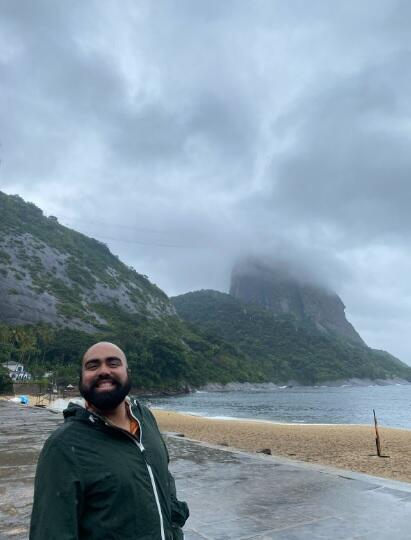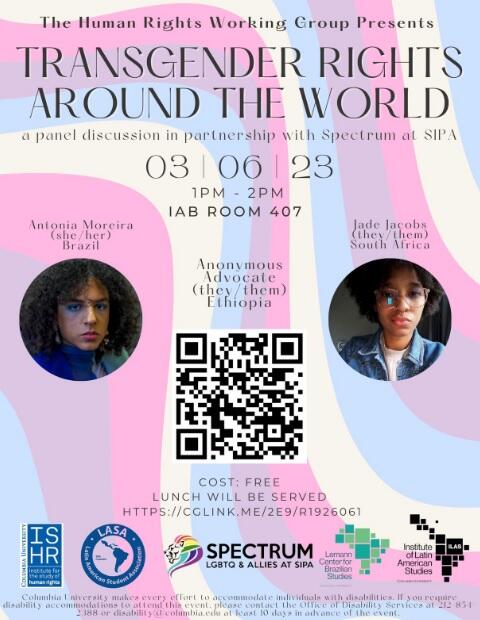
Program Assistant Introduction: Angel Ornelas MIA ‘24
Note from Admissions: We're excited to welcome our new group of program assistants (PAs) working with us here in the SIPA Office of Admissions and Financial Aid. They’ll specifically be helping you through the application and decision process over the next few months through answering your emails, calls, and writing relevant blog posts to help you during this admission process.

Born and raised in Texas, Angel Ornelas (he/him/his) is a second-year MIA candidate concentrating in Urban/Social Policy (EPD) and specializing in International Organization & United Nations Studies (IO/UNS), and Gender Public Policy (GPP). As a Donald M. Payne Fellow, Angel will join the U.S. Agency for International Development (USAID) as a Foreign Service Officer and work on education policy issues. Prior to SIPA, Angel worked in urban education in Dallas, TX as a college advisor. During his undergraduate career, Angel studied abroad in Mexico City and conducted oral history research on the HIV/AIDS epidemic and LGBTQIA+ identity. Angel earned his Bachelor of Arts in History at Claremont McKenna College. In his spare time, Angel enjoys collecting records, listening to Bad Bunny, and checking out the best comedy clubs in town.
What experiences do you think prepared you to apply to/attend SIPA?
During my second year of undergrad, I studied abroad in Mexico City and volunteered at an HIV clinic serving the LGBTQ+ community. I enrolled in el Instituto Tecnológico Autónomo de México (ITAM) and took courses in Latin American affairs, Political Science, and Latin American Geopolitics. ITAM “seeks to contribute to the individual's comprehensive education and to develop a freer, more just, and prosperous society.” The school’s emphasis on public service coupled with my experience supporting LGBTQ+ locals seeking HIV treatment services led me to further my education and pursue a career in public service. After college, I worked as a high school counselor and helped seniors with their applications to college. Supporting first-generation students from immigrant families made me realize I wanted to devote my life to public service. Enrolling in the MIA program at SIPA concentrating on Social Policy was the best decision I made to complement my prior experiences.
What advice do you have for current applicants?
Everyone has a unique story to tell. Before starting your personal statement, I would jot down a bullet list of things that are unique to you. Reflect on events that have changed your life. Draw on jobs that have influenced your perception of the world. Then, after you have a couple of bullet points down, draft your personal statement connecting these experiences. Once you have a cohesive narrative, relate those experiences to SIPA. How have these experiences informed your decision to attend SIPA? How do SIPA’s mission statement and values connect to your identity? Creating these connections is important for crafting a successful personal statement.
What was the most challenging aspect of the application process?
The most challenging aspect of the application process was learning about SIPA’s concentrations and specializations. During my first year at SIPA, I switched my concentration from EPD to USP. I realized (it’s never too late to switch to USP in your first year!) that EPD courses were not aligned with what I was interested in pursuing after SIPA. Plus, I’m not the best at economics, so EPD was very challenging. USP courses take a holistic approach to the world and consider a wide range of factors such as race and socioeconomic status to develop policy solutions.

SIPA features lots of events for students to attend. Is there any interesting presentation that you have attended that you could comment upon?
Last semester, I helped organize and attended the following event: Transgender Rights Around the World: A Panel Discussion in Partnership with Spectrum at SIPA and the Institute for the Study of Human Rights. Three trans activists were brought to SIPA to discuss their advocacy experience in Brazil, South Africa, and Ethiopia. Their experiences were very enlightening and inspirational, giving me hope that the battle for the protection of LGBTQ+ rights around the world will be won (eventually).
Have you taken classes at other Columbia Schools?
I am currently enrolled in three Teacher’s College courses: Education Policy Across the Americas, Education in Emergencies, and Civil Society and NGOs in International Education Development. These courses are very hands-on and involve working with an external client such as the International Rescue Committee. These practical courses complement my coursework at SIPA.
What has been the most challenging part of your SIPA experience?
The most challenging part of SIPA is balancing social events, cool speaker events, part-time opportunities (such as research assistantships or casual jobs), and academics. Finding a balance in graduate school is very different from working a standard 9am-5pm job. I would recommend taking on a light load and slowly adding things over time. Overwhelming yourself at the very start of your SIPA journey can be very difficult and discourage you from enjoying everything that SIPA has to offer.